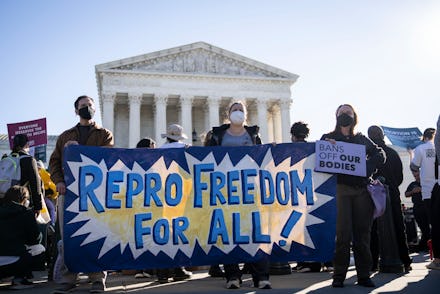The Supreme Court’s evaluation of the Texas abortion laws has begun
Oral arguments got underway Monday in the case that could determine the future of abortion in the U.S.

After Texas passed among the most restrictive anti-abortion laws in the country earlier this year, people have been rallying to get them barred. From a collective of nonprofits filing a lawsuit to the Department of Justice stepping in, nearly every legal avenue has been exhausted. Now, abortion rights activists are watching with bated breath as the Supreme Court listens to oral arguments about Texas’s laws, following a direct appeal from the Justice Department.
For a quick recap: In August, Texas Gov. Greg Abbott (R) signed two bills that effectively banned abortion overnight. The bills went into effect Sept. 1, restricting abortions through multiple avenues. First, they banned all abortions after fetal heartbeats are found even though these can be detected as early as six weeks into pregnancy (which is before most people know they’re pregnant).
Second, Texas turned private citizens into vigilantes of sorts. Rather than having the state itself police abortion providers, one of the laws — S.B.8 — allows private citizens to sue anyone helping people access abortions. That includes not only medical providers but also nonprofits who might cover abortion costs, people providing rides to clinics, and even a family member offering money for the procedure. If the lawsuit is successful, the person who sued can receive up to $10,000 from the state.
There have been a slew of attempts to halt Texas’s laws. On Oct. 6, one judge actually blocked the ban on abortions after a fetal heartbeat is detected, but the Fifth U.S. Circuit Court of Appeals later said the law can stay in place. That prompted the Justice Department to directly ask that the Supreme Court review the Fifth Circuit’s decision. Which leads us to the oral argument that we’re hearing today.
This is the second time SCOTUS is considering the Texas laws. The first time around, the justices declined to block the laws, letting them go into effect in the first place. This time, the Department of Justice is trying a different strategy, arguing that Texas’s private bounty system was an “unprecedented” and unconstitutional attack on abortion access.
As you can expect from the primarily conservative Supreme Court, there have already been plenty of clear “WTF” moments during Monday’s session:
Everything seemed to start out fine. To begin the proceedings, Solicitor General Elizabeth Prelogar broke down the Justice Department’s central reasoning for suing Texas. It’s not just that the Biden administration believes the laws are unconstitutional, it’s that Texas designed its laws to specifically to circumvent the right to abortion access guaranteed by Roe v. Wade. Per CNN, Prelogar stated, “Texas designed S.B.8 to thwart the supremacy of federal law in open defiance of our constitutional structure.”
She continued, “States are free to ask this court to reconsider its constitutional precedents, but they are not free to place themselves above this court, nullify the Court’s decisions in their borders, and block the judicial review necessary to vindicate federal rights.”
But of course, things started to get weird. For example, Justice Samuel Alito — one of two justices whose comments Monday have consistently sided with Texas so far, per the SCOTUS Blog — started arguing that a hypothetical patient who wants to sue their abortion provider for emotional harm wouldn’t be able to if Texas’s laws weren’t in place. Justice Sonia Sotomayor, one of the three liberals remaining on the court, quickly pointed out that this hypothetical patient could sue under any other theory — so in other words, Alito’s argument should not be a justification to prevent all people from getting abortions.
As the arguments continue, it’s hard to determine what exactly will happen with Texas’s laws. But at the end of the day, it’s clear that regular people will do what is necessary to help others if the courts fail. So far, we’ve seen TikTok users flood the page of Texas’s largest anti-abortion group with fake tips, and a number of nonprofits are still offering not only funding assistance, but driving them outside of the state to receive abortions elsewhere.
Texas politicians may want to outlaw abortion. To some extent, they can do so within its own borders. But if people want abortions, they will receive them. All Texas has done with its barriers is ensure that more people will turn to increasingly dangerous options because they no longer have the safe and secure option of turning to an abortion provider.